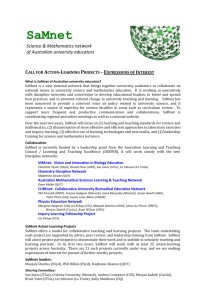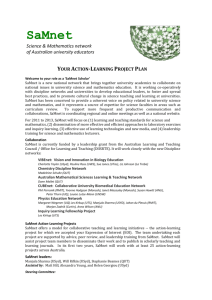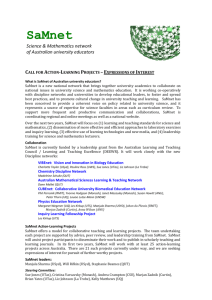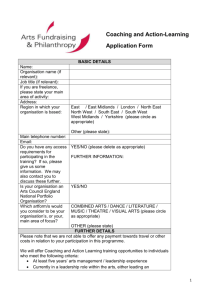ALP_EOI_form - School of Physics
advertisement
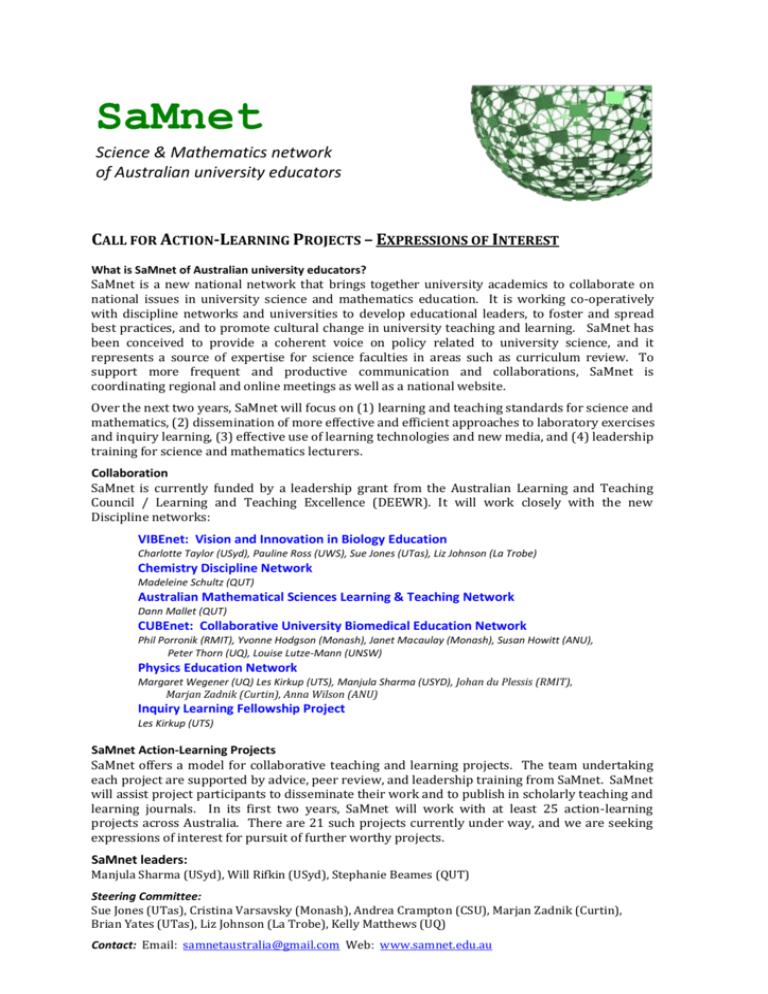
SaMnet Science & Mathematics network of Australian university educators CALL FOR ACTION-LEARNING PROJECTS – EXPRESSIONS OF INTEREST What is SaMnet of Australian university educators? SaMnet is a new national network that brings together university academics to collaborate on national issues in university science and mathematics education. It is working co-operatively with discipline networks and universities to develop educational leaders, to foster and spread best practices, and to promote cultural change in university teaching and learning. SaMnet has been conceived to provide a coherent voice on policy related to university science, and it represents a source of expertise for science faculties in areas such as curriculum review. To support more frequent and productive communication and collaborations, SaMnet is coordinating regional and online meetings as well as a national website. Over the next two years, SaMnet will focus on (1) learning and teaching standards for science and mathematics, (2) dissemination of more effective and efficient approaches to laboratory exercises and inquiry learning, (3) effective use of learning technologies and new media, and (4) leadership training for science and mathematics lecturers. Collaboration SaMnet is currently funded by a leadership grant from the Australian Learning and Teaching Council / Learning and Teaching Excellence (DEEWR). It will work closely with the new Discipline networks: VIBEnet: Vision and Innovation in Biology Education Charlotte Taylor (USyd), Pauline Ross (UWS), Sue Jones (UTas), Liz Johnson (La Trobe) Chemistry Discipline Network Madeleine Schultz (QUT) Australian Mathematical Sciences Learning & Teaching Network Dann Mallet (QUT) CUBEnet: Collaborative University Biomedical Education Network Phil Porronik (RMIT), Yvonne Hodgson (Monash), Janet Macaulay (Monash), Susan Howitt (ANU), Peter Thorn (UQ), Louise Lutze-Mann (UNSW) Physics Education Network Margaret Wegener (UQ) Les Kirkup (UTS), Manjula Sharma (USYD), Johan du Plessis (RMIT), Marjan Zadnik (Curtin), Anna Wilson (ANU) Inquiry Learning Fellowship Project Les Kirkup (UTS) SaMnet Action-Learning Projects SaMnet offers a model for collaborative teaching and learning projects. The team undertaking each project are supported by advice, peer review, and leadership training from SaMnet. SaMnet will assist project participants to disseminate their work and to publish in scholarly teaching and learning journals. In its first two years, SaMnet will work with at least 25 action-learning projects across Australia. There are 21 such projects currently under way, and we are seeking expressions of interest for pursuit of further worthy projects. SaMnet leaders: Manjula Sharma (USyd), Will Rifkin (USyd), Stephanie Beames (QUT) Steering Committee: Sue Jones (UTas), Cristina Varsavsky (Monash), Andrea Crampton (CSU), Marjan Zadnik (Curtin), Brian Yates (UTas), Liz Johnson (La Trobe), Kelly Matthews (UQ) Contact: Email: samnetaustralia@gmail.com Web: www.samnet.edu.au SaMnet of Australian university educators Action-Learning Project -- Expression of Interest Send EOI to SaMnetAustralia@gmail.com by 9 April 2012. Selection criteria: A. Emphasis on changing how a collective teaches B. Rationale and evidence on why the change is needed C. Potential for impact on applicant, teammates, school, faculty, and discipline 1. Project title: 2. Applicant Team leader – Are you (tick one or more): Innovative (or junior) academic - Sees the change that is needed Senior Academic - Understands the challenges of creating change Educational developer, Academic staff developer, or equivalent Knows cases beyond the faculty and relevant concepts from the literature Associate Dean (Education) or equivalent - Has faculty–wide insight and knows priorities Name: E-mail: Discipline: Faculty: .edu.au 3. Project Scope (the collective being addressed) Target Degree programs, Years of study, and Disciplines 4. Project Description (rationale and evidence) Aims, Innovation, Rationale, Precedent - What do you want to change (e.g., nature of lab work in second year) and why 5. Outcomes (potential for impact) Expected outcomes if successful (e.g., higher pass rates), why those outcomes, impacting how many students (estimated) 6. Project Implementation What capabilties you hope to build, what do you want to learn about leading change 7. Comments or Questions What do you need to know? Where can you use assistance? 2 SaMnet of Australian university educators FAQ’s 0. Submitting the proposal Fill in the blanks. Just a line or two for each blank is sufficient. A full project plan is also welcome – pasted in or as an attachment. More than one EOI may be submitted from any individual, team, school, faculty, or university. 1. What counts as an Action-Learning Project / ‘change initiative’? The Action-Learning Projects are ‘change initiatives’ in that they are a way to address a problem that you see in your school or faculty. That could be a high dropout rate for majors or heavy emphasis on final exams. An action-learning project can also be a way to disseminate a teaching strategy that you have developed or means to implement a new curriculum. For example, do you have a method for improving feedback to students that ought to be used more widely? What we are not counting as a ‘change initiative’ is an experiment in teaching that you are not planning to embed more broadly within your school or beyond. A change initiative takes an idea – an invention – and turns it into an ‘innovation’ – something that others are taking up. 2. What if I have already started the effort? It is fine if you have already started. These action-learning projects have been conceived to support people to do things that they want to do anyway, and to learn through this pursuit via our support. You are welcome to apply to SaMnet for assistance with a project that is already internally funded. SaMnet will also support a project funded by the ALTC fellowship in inquiry learning (c/- Les Kirkup) or a curriculum mapping effort with Beverley Oliver, to name two of many examples. 3. What if my Action-Learning Project has limited success? Null or negative results are viable options. SaMnet action-learning projects are not premised on your need to deliver 100-percent success. However, it is important to avoid ‘reinventing the flat tyre’, failing in a way that experienced hands (and the literature) would readily predict. Our action-learning projects are meant to increase your understanding of what it takes to lead change. You can learn to connect with the right people in the right way and to successfully navigate university politics. You can also learn through reflection on new experiences. The outcome of your effort is meant to be an increase in the capacity to drive change for you and your teammates. The record of what you tried, what worked, and what failed to work informs others who face similar challenges. 4. Can you provide support funding in small, unmarked bills? SaMnet provides support in the form of leadership development training, coaching, networking, and mentoring in both management and publication. There is no funding provided by SaMnet for teaching relief or research assistants. A SaMnet initiative is meant to be part of your weekly investment in research or administration. You will be rewarded with increased capability to persuade and lead. You will gain an internal sense of accomplishment. You will become part of a larger community, a movement to improve university teaching in science and mathematics in Australia. You will earn ‘points’ with publications. You will also contribute toward lifting the profile of academics who apply their intellect to improving teaching, a key objective of SaMnet. 5. Why me? The culture of teaching in university science and mathematics needs to change. Many people have developed new and more effective ways to teach and assess. The ALTC and its predecessors have funded more than 40 projects across the disciplines of science and mathematics. Such individual initiatives now need to gain traction locally, in your university, to instil sector-wide change. 15/3/12 -- altc nation leadership network in sci & maths \ action learning projects \ prop form \ EOI 3
